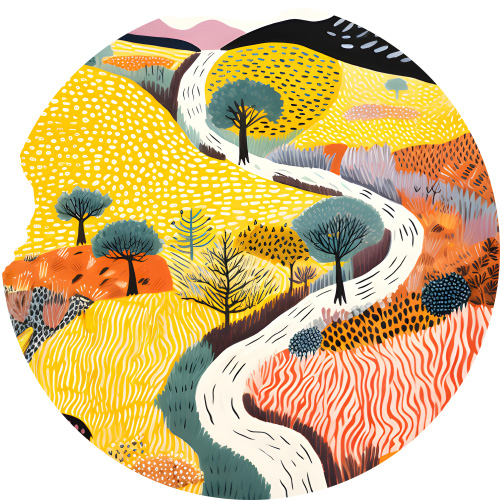The Scenic Route: Chapter 3 of 6
| September 26, 2023No way will I be the married-for-three-years-without-a-baby nebach case at the wedding

MY
younger sister Tova is getting engaged! I am so excited; really, I am. It’s been a while since our family has had a simchah, and we are ready to party. At the same time, a worm of fear wriggles its way into my heart.
Will Tova skip us?
Betzalel laughs me away in the way that only husbands can.
“Seriously? You’re stressing about that now? She’s not even married yet! A million things could happen before her wedding or right after! Don’t worry for a second!”
I try not to.
But I decide that as my own secret consolation prize, I’m going look my best at the wedding. My gown will be stunning, my sheitel gorgeous, my makeup flawless. No way will I be the married-for-three-years-without-a-baby nebach case at the wedding.
The big day arrives.
I look just as I’d wanted to. I walk into the hall and force myself to mentally shelve my troubles for the night. The music plays softly as the band does a sound check. I exchange mazel tovs with all the early guests: aunts and uncles, siblings-in-law, my in-laws who came in from Brooklyn, and everyone else.
I try not to think about it too much, but my arms are conspicuously empty, especially since my mother rented matching baby outfits for all the grandchildren for the occasion.
During pictures, every sister and sister-in-law in the family has a baby on her lap — many of them born well after our wedding. And now there is a good chance that Tova will skip us, too, a thought too painful to harp on.
When the photographer calls us for our couple’s picture, I will everyone to look the other way.
“Where’s your baby?” he calls. I blanch.
“We don’t have one yet!” Betzalel answers cheerfully.
While I smile brightly for the photographer, I feel my kishkehs collapsing. Deep in my mind, my sobs are loud enough to pierce the Heavens.
After pictures, I just stand at the side, wishing myself far, far away. My husband’s uncle, the uncle everyone loves and wishes they had, sidles up to my husband and me with a shot glass.
“We are going to dance so hard when your nisayon finally ends,” he whispers meaningfully, his eyes mirroring the pain in my heart. “And I’m davening that it should end really, really soon. L’chayim to that.”
He raises his glass, drinks, and is off.
The pain lessens. Somebody realizes what we’re going through. Somebody gets it and cares. We’re not alone.
On the other hand, when Tova’s baby is born just 10 months after her wedding, no one in the family says a word to us.
“I think everyone forgot about us,” I tell my husband as we leave the shalom zachar.
We walk silently through the yeshivah area and stand waiting at the light on Madison and Ninth.
I wipe my nose fiercely, willing myself not to cry on Shabbos. “Should I have said something? Told them I’m hurting?”
“They’d probably feel really awkward if you did that,” Betzalel says, making a face.
I roll my eyes. “So is our pain just too awkward to talk about? Do we have to do this all alone so that they don’t feel uncomfortable?”
Betzalel pauses. “I think that this one is going to be our choice. Maybe it’s our job to tell them what we want. And if you’re ready to do it, it might be awkward, but it might feel better for you.”
“I’ll never do that,” I vow forcefully. “I don’t want people to feel like they have to walk on eggshells around us.”
But a year later, when the pain and resentment I feel at every simchah and Yom Tov has grown to epic proportions, I realize that something has to change.
It’s Yom Tov season, and my older sister Adina calls.
“I’m so excited that we’re being by Ma the same half of Succos as you!” she chirps. “When are you coming?”
I roll my eyes. As late as possible.
“I’m not sure exactly. Later, after everyone has settled their kids.”
Adina sighs deeply. “Chavy, I know it’s not easy. I daven so hard.”
I exhale.
“So why don’t you ever say so?” I burst out. “Why is it always the elephant in the room?”
“We’re never sure what you and Betzalel want,” Adina says. “Maybe you want us all to be natural, and not to be nebaching you, you know? And we’re all so scared to say the wrong thing! Chavy, what do you want us to do?”
I hear the honesty in her question, and the anger slowly drains out of me. “Well, you can start by saying you’re thinking about me if you are,” I say. “It makes it so much less lonely, and the loneliness is the worst. And I don’t want everyone to walk on eggshells around me at all. But maybe sometimes, people can try not to talk only about kids and babies and nursing and births around me. At this point it’s just not sensitive.”
Over the phone line, Adina sounds so relieved. “Can I tell everyone you said so?”
I hesitate. “I guess so. I hope everyone will use their brains. We don’t want people to never say the word ‘baby’ next to us. But we don’t want people to gush on and on about babies next to us either! I guess it’s a middle ground… but the fact that I know you’re thinking about us already makes it easier, at any rate.”
When I finally get to my parents’ house 45 minutes before lichtbentshen, I find my favorite chocolate on my bed, along with a little card. “We are with you!! Thinking about you all day, every day. Love, Mommy and Abba”
You know what? There are still hard moments that Yom Tov, and some siblings still say dumb things. But the chocolate helps.
To be continued…
(Originally featured in Family First, Issue 862)
Oops! We could not locate your form.



